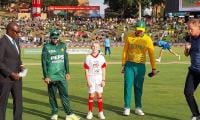LONDON: Labour has dominated the mayoral elections, claiming 10 of the 13 posts being contested in cities and metropolitan regions across England.
The Tories have won two of the contests so far, and West Yorkshire, which will be electing a mayor for the first time this year, was yet to return a result.
Labour’s winners include Sadiq Khan, who described being re-elected for London as “the absolute honour of my life”, and pledged to “build a better and brighter future” for the city during his second term.
His battle with Conservative rival Shaun Bailey was much more closely fought than opinion polls suggested, and the pair faced an anxious wait in City Hall as second preferences were taken into account on Saturday night.
At 11pm Khan’s win was announced with 1,206,034 votes – 55.2 per cent of the vote – compared with Bailey’s 977,601.
In another closely fought contest taking second votes into account, Dr Nik Johnson claimed Cambridgeshire and Peterborough from Conservative incumbent James Palmer.
The final results showed Dr Johnson clinched the victory with 51.3 per cent of the vote versus Palmer’s 48.7 per cent
Standing outside a polling station sign positioned below a defibrillator after casting his vote, Dr Johnson pledged to “jump start the future of Greater Cambridgeshire”. In the West of England region, Dan Norris beat Conservative rival Samuel Williams, taking the post from previous Tory incumbent Tim Bowles with 59.5 per cent of the vote.
Norris, who celebrated his victory outside the SS Great Britain with his dog Angel, told Times Radio that he owed his triumph to leader Sir Keir Starmer and that he felt Labour is still the party of the working class.
Meanwhile, Labour’s Joanne Anderson made Liverpool City’s mayoral history by becoming its first black female mayor. After a close first poll led to second ballots being counted, she claimed victory with 59.2 per cent ahead of independent candidate Stephen Yip with 40.8 per cent.
Labour incumbents Andy Burnham, Steve Rotheram, Marvin Rees, Norma Redfearn, Paul Dennett and Ros Jones retained their respective roles in Greater Manchester, Liverpool City Region, Bristol, North Tyneside, Salford and Doncaster.
Burnham thanked voters for electing him to “the best job in the world in the best city-region in the world” on Twitter and entertained the suggestion of becoming leader of the Labour Party “in the distant future” during an interview with Sky News.
Meanwhile, Conservative candidate Andy Street easily retained his position as mayor of the West Midlands, beating Labour’s Liam Byrne by 314,669 votes to 267,262.
In a tweet he said he would “do everything I can to repay the trust and confidence given to me by the people of our great region”. Tory Ben Houchen was also re-elected as Tees Valley mayor by a landslide, taking almost 73 per cent of the vote.
Bushra, who delivered revolutionary speeches on November 24 and 26, had now left Peshawar, says Azma
Police launch search operation and registers case against unidentified attackers on complaint of victim’s cousin
Victim demands justice, alleging that she was harassed by two officials
Punjab CM enquires about school’s budget, curriculum and teaching methodologies
Ali Zafar urges govt to create conducive environment for talks
Sindh CM says work on the K-IV Augmentation Project would begin on December 30, 2024







